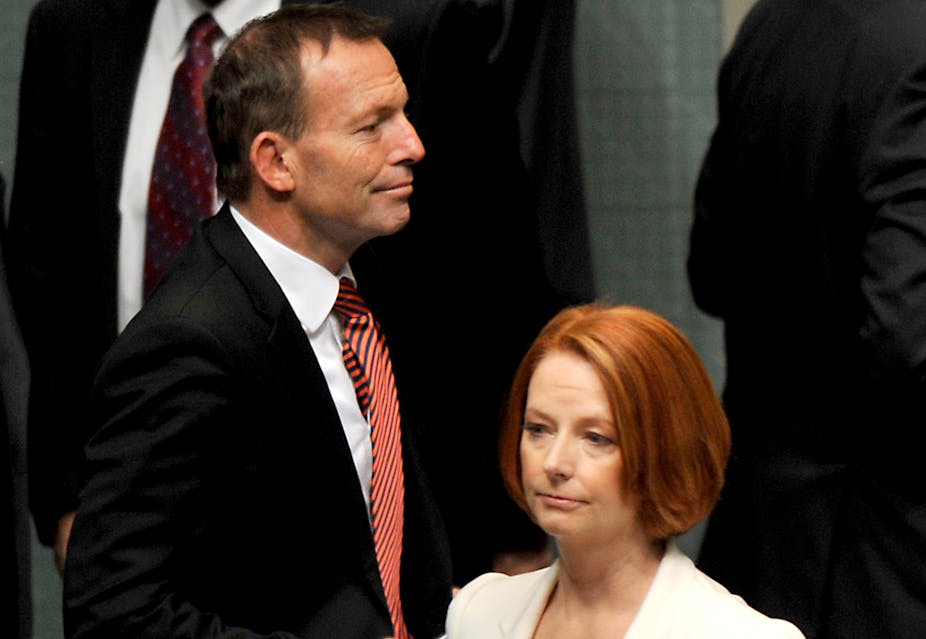The decision last month by Opposition Leader Tony Abbott to severely restrict the practice of “pairing” votes in Parliament is another demonstration of the fractious and polarised state of federal politics since the 2010 election.
The long-standing practice of parliamentary pairing occurs when MPs are unable to attend a vote, due to illness or personal emergency, or when on official business overseas or away from Canberra. To preserve the numbers in parliament, and essentially reflect those chosen by the electorate, an equal number of opposing MPs abstains from the vote.
The offices of the chief party whips – currently Joel Fitzgibbon for Labor, and Warren Entsch for the Coalition – negotiate requests made for pairs.
The system is generally mutually beneficial, as the paired abstaining MP is freed up to attend to other party business. This convention of courtesy is a private arrangement between the political parties, and not part of the formal standing orders of parliament.
The convention
In the current 43rd parliament, the government has rejected only one out of 27 requests by the Opposition for pairs, while the Opposition has rejected 60 out 185 Government requests.
During most parliaments, the practice of pairing has generally been a formality, particularly in the lower House of Representatives, where the Government usually enjoys a substantial majority.
But, with the present minority government in a hung parliament, pairing has become an issue of vital political importance.
If a pair is not granted, legislation will fail to pass. Recognising this vulnerability, particularly in the lead-up to the vote on the carbon tax, Abbott declared last month that pairs will no longer be granted by the Opposition for the remainder of the year in the House of Representatives, unless in cases of unavoidable illness or personal emergency.
In the Senate though, pairing is being maintained, reflecting the generally more sedate and calmer atmosphere of the Upper House.
Requests denied
Following the recent death of prominent artist Margaret Olley, Arts Minister Simon Crean and Malcolm Turnbull were set to pair for each other to attend her funeral, but this was disallowed. This was an especially petty decision by Abbott, and particularly galling to Turnbull, a friend of Olley’s, particularly as Senator George Brandis was sent to represent the Opposition at the funeral instead.
Defence Minister Stephen Smith was also recently forced to cancel addressing a conference on Australia-India relations held by the Lowy Institute, and Kevin Rudd had to return to Parliament earlier than planned, with a pairing also refused.
There was speculation that embattled Labor MP Craig Thomson would not be granted a pair to attend birth of his child, until Abbott relented from an earlier threat, and pledged to allow it.
Special Minister of State Gary Gray was given a pair, due to illness.
Gentlemen’s agreement
By restricting pairing, Abbott is relentlessly pressuring the government whenever he can, and will definitely not allow any pairs for the upcoming vote on the carbon tax.
But, in pursuing such tactics, the opposition can be accused of eroding the fragile sense of bipartisanship and cooperative spirit in parliament.
Despite the robust adversarial nature inherent in the Westminster system, the tradition of pairing reflects higher parliamentary ideals, that MPs are democratically elected to represent the shared interests of the Commonwealth, and are expected to act in a cordial and considerate manner towards each other to some extent.
Suggested reforms to consolidate the convention of pairing, while desirable, would be difficult to achieve.
It would require changes to the present standing orders of Parliament, the rules by which parliamentary procedure is established and enforced by rulings of the Speaker.
The House Procedures Committee would have to discuss and approve any such amendments, but pairing has not been on its agenda of procedural reforms for the 43rd parliament.
It seems we will have to rely on the good graces of MPs overcoming the current acerbic political environment to preserve the voluntary convention of pairing.

